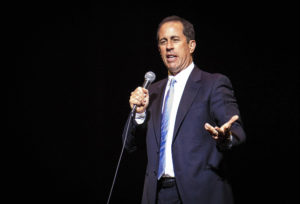Religious Humor and Its Discontents

In Seinfeld’s 153rd episode, “The Yada Yada,” Jerry’s dentist converts to Judaism and begins to make Jewish-themed wisecracks, so much so, Jerry quips that the dental care professional only converted “for the jokes.” While the episode is now twenty years old, having aired in the Spring of 1997, its commentary on religious humor reverberates today as society continues to debate what’s okay and what’s off-limits in terms of holy humor. Seinfeld himself has more recently come out against so-called “PC culture,” saying he no longer performs at college campuses because students don’t understand racism and sexism and that political correctness is ruining comedy.
In Norway, a national study on religiously themed humor was published recently, revealing that four in five Norwegians believe it’s okay for a comedian to make fun of religion, while only one in four believe it’s okay for politicians to do so. Even fewer believe it’s appropriate for teachers to tell jokes about religion. However, twice as many Norwegian respondents agree that in general it’s more problematic to make fun of Islamic symbols than to make fun of Christian symbols.
While some (probably Seinfeld included) may charge this sentiment as hypocrisy, it actually helps form a message found in that twenty-year old episode: the joke-teller’s cultural background, as well as how dominant their cultural background is in society, matters when measuring a joke’s success. Even Seinfeld, now a stark opponent of political correctness, recognized the discomfort that can come from making fun of a religion and an identity that has faced discrimination, persecution, and genocide. But of course, the clincher of the joke is not that “Jew jokes” shouldn’t be made, but that when they are made by comedians of a different religion or identification, the meaning of the jokes changes.
Unfortunately, xenophobia and orientalism, having underlined the perceptions of those in the western world for centuries, have seen a resurgence in the twenty-first century in the form of bigoted rhetoric against Muslims touted by Western political figures from Nigel Farage to Donald Trump to Marine Le Pen. This rhetoric has turned into reality as the Southern Poverty Law Center reports an increase in hate crimes against Muslims since the election of Trump. Knowing this, it’s easy to understand why many feel that a comedic targeting of Islam is less acceptable than a comedic targeting of Christianity.
Comedy does not exist as some separate sphere of society. Rather, it’s deeply intertwined with people’s social and political experiences. It’s an outlet to comment about the absurdities and inconsistencies found in life and poke fun at those in power and the prevailing notions of our time. Most of us are comfortable with non-Christians making jokes about Christianity because Christianity is the ideology in power. Christianity dominates US culture; it permeates our politics and exerts massive influence over the laws of our land. Islam hardly holds the same kind of power in our society. Now this doesn’t mean “Muslim jokes” can’t be made. But it does imply that Muslim jokes should be made by Muslim comedians. Again, most of us are comfortable with non-Christians making jokes about Christianity because Christianity is the ideology in power. Muslim-Americans, on the other hand, face incredible acts of hate and violence by dominant groups. Comedy, just like politics, must operate inside this context if it’s to be successful.
A 2013 study showed that humor which disparaged a particular group can lead to discrimination in a society where that group already faces ambivalent attitudes. US participants in the experiment already had a prejudice against Muslims and those who read anti-Muslim jokes were more likely to allow for discrimination against Muslims than those who read anti-Muslim statements or neutral jokes. What we choose to think is funny and who we deem laughable has crucial effects in society as it can provide social approval for people’s prejudices when one group is mocked by another.
Again, we come back to that Seinfeld episode. There would be no need to point out that the dentist converted to Judaism just “for the jokes” if there wasn’t something inherently more okay about poking fun at one’s own culture than at someone else’s. With the heightened success and attention paid to comedians like Aziz Ansari, Hasan Minhaj, and Kumail Nanjiani, all of whom grew up in Muslim households, “Islam-jokes” have become less about mocking Islam and more about connecting audiences to a new and unfamiliar culture. These comedians use their personal experiences to create jokes that are thought-provoking and challenging, as well as funny.
Whether it’s Ansari crafting a whole episode about his disaffiliation with the Muslim faith, Minhaj explaining the Muslim-Hindu divide in India with a circle chart, or Nanjiani making a 9/11 joke in his new film, these comedians are using religious humor to expand conceptions and conversations. They show us that their faith is not beyond humor, and that audiences of all religions are able to access, laugh with, and enjoy a new perspective and narrative.
